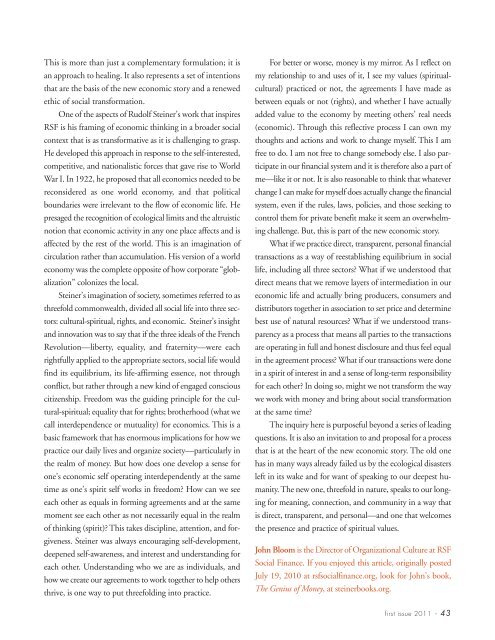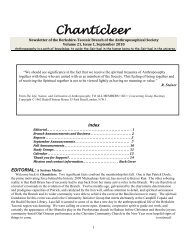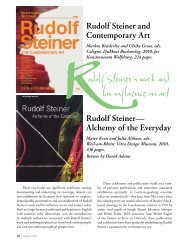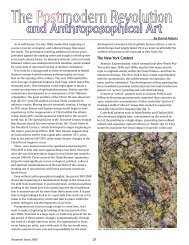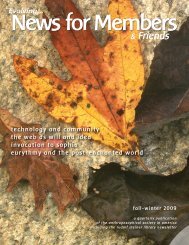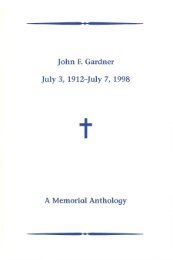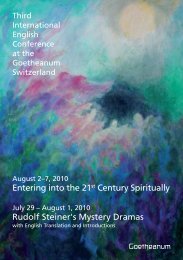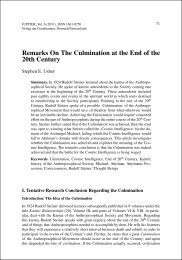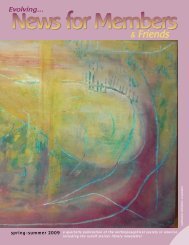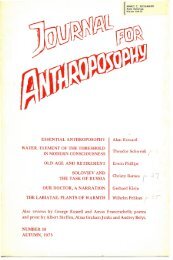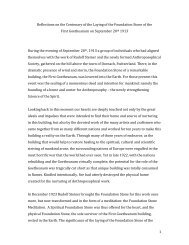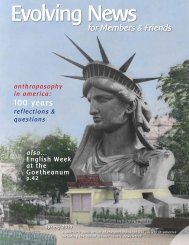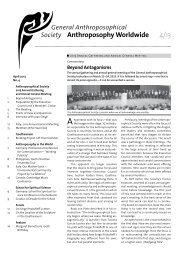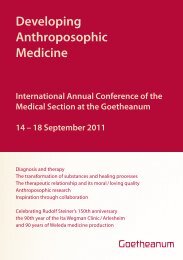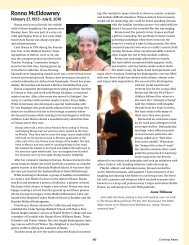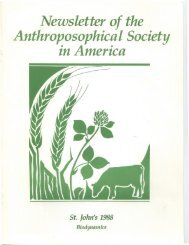Rudolf Steiner's Vision for the Future - Anthroposophical Society in ...
Rudolf Steiner's Vision for the Future - Anthroposophical Society in ...
Rudolf Steiner's Vision for the Future - Anthroposophical Society in ...
You also want an ePaper? Increase the reach of your titles
YUMPU automatically turns print PDFs into web optimized ePapers that Google loves.
This is more than just a complementary <strong>for</strong>mulation; it is<br />
an approach to heal<strong>in</strong>g. It also represents a set of <strong>in</strong>tentions<br />
that are <strong>the</strong> basis of <strong>the</strong> new economic story and a renewed<br />
ethic of social trans<strong>for</strong>mation.<br />
One of <strong>the</strong> aspects of <strong>Rudolf</strong> Ste<strong>in</strong>er’s work that <strong>in</strong>spires<br />
RSF is his fram<strong>in</strong>g of economic th<strong>in</strong>k<strong>in</strong>g <strong>in</strong> a broader social<br />
context that is as trans<strong>for</strong>mative as it is challeng<strong>in</strong>g to grasp.<br />
He developed this approach <strong>in</strong> response to <strong>the</strong> self-<strong>in</strong>terested,<br />
competitive, and nationalistic <strong>for</strong>ces that gave rise to World<br />
War I. In 1922, he proposed that all economics needed to be<br />
reconsidered as one world economy, and that political<br />
boundaries were irrelevant to <strong>the</strong> flow of economic life. He<br />
presaged <strong>the</strong> recognition of ecological limits and <strong>the</strong> altruistic<br />
notion that economic activity <strong>in</strong> any one place affects and is<br />
affected by <strong>the</strong> rest of <strong>the</strong> world. This is an imag<strong>in</strong>ation of<br />
circulation ra<strong>the</strong>r than accumulation. His version of a world<br />
economy was <strong>the</strong> complete opposite of how corporate “globalization”<br />
colonizes <strong>the</strong> local.<br />
Ste<strong>in</strong>er’s imag<strong>in</strong>ation of society, sometimes referred to as<br />
threefold commonwealth, divided all social life <strong>in</strong>to three sectors:<br />
cultural-spiritual, rights, and economic. Ste<strong>in</strong>er’s <strong>in</strong>sight<br />
and <strong>in</strong>novation was to say that if <strong>the</strong> three ideals of <strong>the</strong> French<br />
Revolution—liberty, equality, and fraternity—were each<br />
rightfully applied to <strong>the</strong> appropriate sectors, social life would<br />
f<strong>in</strong>d its equilibrium, its life-affirm<strong>in</strong>g essence, not through<br />
conflict, but ra<strong>the</strong>r through a new k<strong>in</strong>d of engaged conscious<br />
citizenship. Freedom was <strong>the</strong> guid<strong>in</strong>g pr<strong>in</strong>ciple <strong>for</strong> <strong>the</strong> cultural-spiritual;<br />
equality that <strong>for</strong> rights; bro<strong>the</strong>rhood (what we<br />
call <strong>in</strong>terdependence or mutuality) <strong>for</strong> economics. This is a<br />
basic framework that has enormous implications <strong>for</strong> how we<br />
practice our daily lives and organize society—particularly <strong>in</strong><br />
<strong>the</strong> realm of money. But how does one develop a sense <strong>for</strong><br />
one’s economic self operat<strong>in</strong>g <strong>in</strong>terdependently at <strong>the</strong> same<br />
time as one’s spirit self works <strong>in</strong> freedom? How can we see<br />
each o<strong>the</strong>r as equals <strong>in</strong> <strong>for</strong>m<strong>in</strong>g agreements and at <strong>the</strong> same<br />
moment see each o<strong>the</strong>r as not necessarily equal <strong>in</strong> <strong>the</strong> realm<br />
of th<strong>in</strong>k<strong>in</strong>g (spirit)? This takes discipl<strong>in</strong>e, attention, and <strong>for</strong>giveness.<br />
Ste<strong>in</strong>er was always encourag<strong>in</strong>g self-development,<br />
deepened self-awareness, and <strong>in</strong>terest and understand<strong>in</strong>g <strong>for</strong><br />
each o<strong>the</strong>r. Understand<strong>in</strong>g who we are as <strong>in</strong>dividuals, and<br />
how we create our agreements to work toge<strong>the</strong>r to help o<strong>the</strong>rs<br />
thrive, is one way to put threefold<strong>in</strong>g <strong>in</strong>to practice.<br />
For better or worse, money is my mirror. As I reflect on<br />
my relationship to and uses of it, I see my values (spiritualcultural)<br />
practiced or not, <strong>the</strong> agreements I have made as<br />
between equals or not (rights), and whe<strong>the</strong>r I have actually<br />
added value to <strong>the</strong> economy by meet<strong>in</strong>g o<strong>the</strong>rs’ real needs<br />
(economic). Through this reflective process I can own my<br />
thoughts and actions and work to change myself. This I am<br />
free to do. I am not free to change somebody else. I also participate<br />
<strong>in</strong> our f<strong>in</strong>ancial system and it is <strong>the</strong>re<strong>for</strong>e also a part of<br />
me—like it or not. It is also reasonable to th<strong>in</strong>k that whatever<br />
change I can make <strong>for</strong> myself does actually change <strong>the</strong> f<strong>in</strong>ancial<br />
system, even if <strong>the</strong> rules, laws, policies, and those seek<strong>in</strong>g to<br />
control <strong>the</strong>m <strong>for</strong> private benefit make it seem an overwhelm<strong>in</strong>g<br />
challenge. But, this is part of <strong>the</strong> new economic story.<br />
What if we practice direct, transparent, personal f<strong>in</strong>ancial<br />
transactions as a way of reestablish<strong>in</strong>g equilibrium <strong>in</strong> social<br />
life, <strong>in</strong>clud<strong>in</strong>g all three sectors? What if we understood that<br />
direct means that we remove layers of <strong>in</strong>termediation <strong>in</strong> our<br />
economic life and actually br<strong>in</strong>g producers, consumers and<br />
distributors toge<strong>the</strong>r <strong>in</strong> association to set price and determ<strong>in</strong>e<br />
best use of natural resources? What if we understood transparency<br />
as a process that means all parties to <strong>the</strong> transactions<br />
are operat<strong>in</strong>g <strong>in</strong> full and honest disclosure and thus feel equal<br />
<strong>in</strong> <strong>the</strong> agreement process? What if our transactions were done<br />
<strong>in</strong> a spirit of <strong>in</strong>terest <strong>in</strong> and a sense of long-term responsibility<br />
<strong>for</strong> each o<strong>the</strong>r? In do<strong>in</strong>g so, might we not trans<strong>for</strong>m <strong>the</strong> way<br />
we work with money and br<strong>in</strong>g about social trans<strong>for</strong>mation<br />
at <strong>the</strong> same time?<br />
The <strong>in</strong>quiry here is purposeful beyond a series of lead<strong>in</strong>g<br />
questions. It is also an <strong>in</strong>vitation to and proposal <strong>for</strong> a process<br />
that is at <strong>the</strong> heart of <strong>the</strong> new economic story. The old one<br />
has <strong>in</strong> many ways already failed us by <strong>the</strong> ecological disasters<br />
left <strong>in</strong> its wake and <strong>for</strong> want of speak<strong>in</strong>g to our deepest humanity.<br />
The new one, threefold <strong>in</strong> nature, speaks to our long<strong>in</strong>g<br />
<strong>for</strong> mean<strong>in</strong>g, connection, and community <strong>in</strong> a way that<br />
is direct, transparent, and personal—and one that welcomes<br />
<strong>the</strong> presence and practice of spiritual values.<br />
John Bloom is <strong>the</strong> Director of Organizational Culture at RSF<br />
Social F<strong>in</strong>ance. If you enjoyed this article, orig<strong>in</strong>ally posted<br />
July 19, 2010 at rsfsocialf<strong>in</strong>ance.org, look <strong>for</strong> John’s book,<br />
The Genius of Money, at ste<strong>in</strong>erbooks.org.<br />
first issue 2011 • 43


